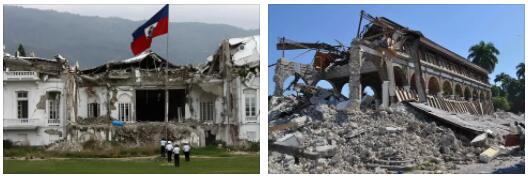Theater
Second in flourishing only to opera, theater is undoubtedly the most popular and most widespread genre of expression in the French Antilles, given its nature as a single cultural vehicle easily usable even by social groups with little or no literacy, the primary requirement of spontaneous immediacy of language capable of establishing the necessary direct contact between author and public, and finally the unavoidable aspiration to affirm and propagate an increasingly conscious ideological and, above all, linguistic-cultural autonomy: in fact, many experiments move in this direction of theatrical writing in Creole. Succubus, like literature, to French models, Haitian theater begins to free itself from them only at the end of the nineteenth century, especially with personalities who,
According to MILITARYNOUS, the most representative authors of these beginnings are M. Coicou, already remembered as a poet and novelist, but undoubtedly more effective as an author of historical dramas (L’oracle, 1893, published in Paris in 1901; Liberté, 1894, represented in 1904 in the capital French; Les fils de Toussaint, 1895; L’empereur Dessalines, 1906) and of tasty political satires, among which Fefé candidat (1906); and C. Moravia (1876-1938), of which at least La crête à Pierrot (1908), Le fils du tapissier (1923) and L’amiral Killik (1923) should be mentioned.
A further tear in an autonomous direction comes from some exponents of indigenism, first of all D. Hippolyte (1889-1967), who from the entertainment comedy (Quand elle aime, 1917; Le baiser de l’aïeul, 1921) and from the political satire (Le forçat, 1929) leads to committed dramas (Le torrent, 1939; Anacaona, and Jour de gloire, 1941). The works of V. Leconte (1866-1932) are also of a good standard, among which we will remember Le roi Christophe (1901), Coulu (1916), Une princesse aborigène (1926); and those of two talented poets, L. Laleau (Amitiés impossibles and Attelage, 1916) and D. Vaval (Mademoiselle Michot ou Blanchette Noire, 1916; Le coup d’arrêt, 1917; Le rachat, 1918; Apothéose, 1925).
The ideological commitment is considerably accentuated in the works written and represented after 1946: to those of authors already known in other literary genres – J.-F. Brierre with Adieu à la Marsellaise (1955) and Pétition et Bolivar (1955); R. Dorsinville with Barrières (1955); F. Morisseau-Leroy, who reaffirms with Anatole and Rara the courageous choice of the Creole language already successfully tested in 1953 with Antigone créole ; R. Philoctète with Dead Roses (1962), with the historical drama Boukman ou le rejeté des Enfers (1963), Les escargots (1965), M. de Vastey (1975) – flanked by notable newcomers, among which F. Fouché (1915-1978), who, in addition to a Creole adaptation of Oedipus re, has composed numerous satirical pièces (Ecole des mères, Ecole des maris, Ecole des politicoens, Bouqui pas bouqui, Bouqui nan paradis, all represented but still unpublished); M. Dauphin (b. 1910), author of the historical plays Boisrond Tonnerre (1954) and Pierre Sully (1960); M. Guérin-Rouzier (b.1934), pleasant and witty author of L’oiseau de ces dames (1966), La pieuvre (1970), La pension Vacher (1976). But the two most interesting personalities are undoubtedly T. Beaubrun (b.1918), whose pseudonym, Languichatte, is the name of the protagonist of almost all of his satirical comedies, from Languichatte se marie (1942) to Languichatte rencontre Maléus (1956), in which situations and language are marked by the reality of Haitian life, passed through the filter of irony and creative vivacity, certainly more happily articulated in costume pieces, including La maison du Baca (1945), Lydia’s Hôtel (1952), Trois hommes deux femmes (1954), Qui a tué Baravil (1960), C’est moi qu’elle aime (1969); and M. Vallès (b. 1939), who in Roi Angole (1974) attempts a ” total ” theater, in which the convergence of mime, song, dance and acting constitutes a recovery of the religious, folkloric and linguistic culture of the territory.
In evident development, and with ever better defined autonomy, the literature of the Antilles is perhaps waiting for greater political stability in order to fully develop its undoubted and very suggestive potential, too often humiliated by suffocating extraneous and gravely prevaricating interference.
Literature
Of Francophone tradition, Haiti’s literature has promoted Caribbean cultural identity. The School of La Ronde (1898-1902) operated in this sense, later more openly D. Bellegarde, who reaffirmed his affinities with France against the American occupation (1915-34); the Revue indigène (1927-29), which carried out a function of recovery of ancestral Africa and voodoo with the essay Ainsi speaks l’oncle (1928) by J. Price-Mars, and of denunciation of contemporary social reality with the interventions by J. Laleau, E. Roumer and J. Roumain ; Les Griots magazine, open to ethnology, which counted the future president among its theorists F. Duvalier ; and finally the militant writings of J.-S. Alexis and R. Depestre. After the exodus of intellectuals hostile to the Duvalier regime, Haitian culture confined itself to the search for a specifically indigenous identity.
